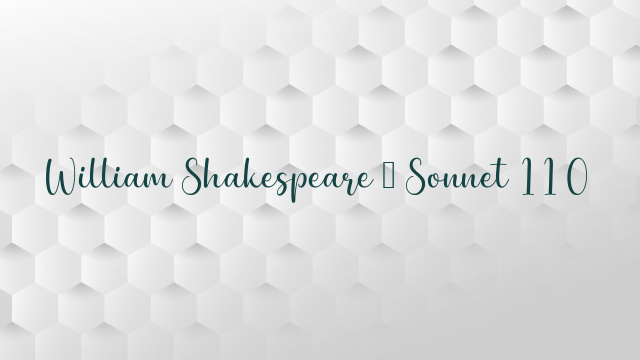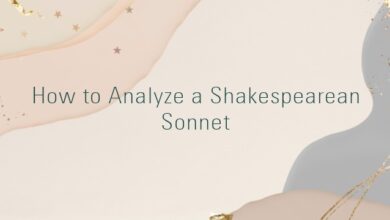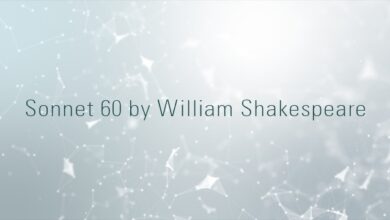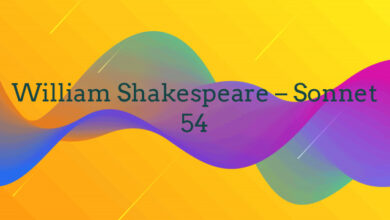
William Shakespeare – Sonnet 110
Alas! ‘tis true, I have gone here and there,
And made my self a motley to the view,
Gored mine own thoughts, sold cheap what is most dear,
Made old offences of affections new;
Most true it is, that I have looked on truth
Askance and strangely; but, by all above,
These blenches gave my heart another youth,
And worse essays proved thee my best of love.
Now all is done, have what shall have no end:
Mine appetite I never more will grind
On newer proof, to try an older friend,
A god in love, to whom I am confined.
Then give me welcome, next my heaven the best,
Even to thy pure and most most loving breast.
A continuation of the apologia for his philandering that the poet admits to in the previous sonnet. It also takes up, though perhaps in a less passionate manner, the idolatry theme of sonnet 105. The poet confesses to his swervings from the path of true love, but asserts that he returns refreshed and with a renewed sense of the divinity and wonder of his former love for the youth. Nothing has changed, if anything his love has increased, and he hopes and trusts that he will be welcomed by the beloved, just as he hopes ultimately for Christian redemption and a return to Abraham’s bosom.
Commentators have understandably seen in this sonnet and the following one ambiguous references to Shakespeare’s career as actor and playwright. The references seem to be rueful and resigned, indicating that he might have wished for better birth and fortune. But it must be admitted that the brief comments that he here makes and in the next one on ‘public means that public manners breeds etc.‘ do not amount to much, and it would be difficult to build a biography on them.
Attitudes to players in the 16th and early 17th centuries were ambiguous. The stage was frequented by many of the wealthy and powerful, and much admired in legal circles, but there was a strong tradition that it fostered and encouraged immorality. The theatres were situated on the South Bank, outside the jurisdiction of the London authorities, in an area renowned for its taverns and brothels. Nevertheless a theatrical career could bring respectability in the end, as Shakespeare’s own record testifies, and that of others such as Heminge, Condell, Burbage, Chapman and Jonson. In the end the growth of Puritanism killed off the theatre in England, but not before Shakespeare’s death. Puritanism was strong even in Elizabethan times, but not strong enough to overturn the favours bestowed on theatrical companies by Elizabeth and her court. The same could be said of James’s time. Nevertheless some of the hostility had an effect, and it is possible that the ‘brand’ mentioned in the next sonnet was the stigma of belonging to the theatre with all the supposedly dissolute practices and morals that such membership implied.
There are also some not so obvious religious references and echoes which hint at another possible interpretation. This is discussed in the Introductory Notes.
The 1609 Quarto Version
ALas ‘tis true,I haue gone here and there,
And made my ſelfe a motley to the view,
Gor’d mine own thoughts, fold cheap what is moſt deare,
Made old offences of affections new.
Moſt true it is,that I haue lookt on truth
Aſconce and ſtrangely: But by all aboue,
Theſe blenches gaue my heart an other youth,
And worfe eſſaies prou’d thee my beſt of loue,
Now all is done,haue what ſhall haue no end,
Mine appetite I neuer more will grin’de
On newer proofe,to trie an older friend,
A god in loue,to whom I am confin’d.
Then giue me welcome,next my heauen the beſt,
Euen to thy pure and moſt moſt louing breſt.
Commentary
1. Alas! ‘tis true, I have gone here and there,Alas, ‘tis true – This seems to be a continuation of the confession of the previous sonnet, in which the poet admits to various liaisons.
I have gone here and there – not so much an admission of travelling, as one of being unfaithful. He has been indiscriminate in his choice of lovers. In the context of the contents of the rest of the sonnet, to have ‘gone here and there’ sounds more like a description of random promiscuity, than of sightseeing.2. And made my self a motley to the view,made myself a motley to the view = made a fool of myself in front of all and sundry; took all sorts of parts, played many roles. Because of Shakeseare’s known connections with the theatre, commentators have attached much importance to this line, thinking that perhaps it is a direct reference to his acting career, and an expression of regret at being thus served by Fortune. However it is not known if Shakespeare a.) ever took the stage part of ‘the Fool’, a part which is found in several of the plays e.g. Twelfth Night, Lear; or b.) if this line has any special reference to such a possibility. It is more likely that the line is simply a self-mocking imagistic reference to his activities over the last few months or years.
motley = fool (a noun).(OED.3.b). It can also refer to the parti-coloured costume which fools traditionally are thought to have worn (although the exact nature of their clothing is not known for certain – the diamond shaped patchwork of Harlequin in the Italian comedies is probably a slightly later development). Originally it was used to describe a type of cheap cloth woven from remainders, hence of no fixed colour. Shakespeare seems to use it synonymously with ‘Fool’, the character in many wealthy households whose task was to provide an endless stream of witticisms.3. Gored mine own thoughts, sold cheap what is most dear,gored = injured, done violence to; besmirched, sullied (from the noun gore which, as well as meaning dried blood, was also a general term for all manner of filth.( OED.(1).1.) . When referring to injury, it is usually the injury caused by a horn, or a horned animal. Shakespeare as often as not uses it figuratively. As in:
I see my reputation is at stake
My fame is shrewdly gored. TC.III.3.227-8.
Commentators also give various meanings drawn from heraldry and heraldic art.
sold cheap what is most dear = cheapened what is essentially most precious to me. The actual selling of anything is presumably not meant, for it is not clear exactly what would be sold. If what is most dear refers to the poet’s love for the youth, or to the youth himself, selling either of them is not an option. However there is perhaps the suggestion of prostituting oneself, or another, engendered by the use of the word sold, although its chief function is to sustain the antithesis between cheap and dear, which is matched by the other antitheses throughout the poem, ‘here, there’, ‘old, new’, ‘worse, best’, ‘newer, older’.
dear = precious, highly valued, revered; expensive.4. Made old offences of affections new;old = habitual; frequent (?), as in Macbeth:
Here’s a knocking indeed! If a man were a porter of hell gate, he should have old turning the key. Mac.II.3.1-3.
offences = injuries, damage, causes of pain and distress. Probably also the biblical meaning of ‘a cause of spiritual or moral stumbling’ (OED.2.) is also included.
affections new = new love affairs. The difficulty with the line, if there is indeed any difficulty, is due to the reversal of subject and object. ‘Made new affections into the habitual, old and oft repeated injuries of the past’.5. Most true it is, that I have looked on truth
truth = reality, truth in love, honesty, sincerity, constancy. There might also be a suggetion of religious truth, the poet implying that he has strayed from the true faith. See the Introductory Notes for further discussion of this.
looked on = looked at, beheld, been an onlooker at (displays of truthfulness etc.). ( OED for ‘onlooker’ gives One who looks on; a looker on; a spectator.) The more modern meaning of ‘given consideration to’ is not intended.6. Askance and strangely; but, by all above,Askance = askew, with a touch of contempt, distortedly. (Suggestive perhaps of a desire to bend or ignore the truth).
strangely = as if it were a stranger to me, or I a stranger to it.
by all above – a mild oath, equivalent to ‘by heaven’, ‘by all that’s holy’.7. These blenches gave my heart another youth,blenches = swervings aside, turnings aside, turnings away from. The noun is not used elsewhere in Shakespeare, but there are five uses of the verb ‘to blench’ in the plays. Two examples follow:
………………..how may I avoid,
Although my will distaste what it elected,
The wife I chose? there can be no evasion
To blench from this and to stand firm by honour:
We turn not back the silks upon the merchant,
When we have soiled them, TC.II.2.65-70
The matter being afoot, keep your instruction,
And hold you ever to our special drift;
Though sometimes you do blench from this to that,
As cause doth minister. MM.IV.5.3-6.
Possibly also the additional meanings of ‘blemishes, soilings’, or ‘sidelong glances’.
gave my heart another youth = gave me a new lease of life, rejuvenated me. But could also be interpreted as ‘gave me a new and younger lover’, ‘gave me a new boyfriend’.8. And worse essays proved thee my best of love.
worse essays = less satisfactory love affairs; morally more degrading attempts at love (seduction ?). Sinful dalliance with other harlot religions.proved thee = showed you to be; gave proof that you were.
my best of love = the best of all my loves; the superlative of all that is found in love. For the use of ‘best’ as a noun, compare:
The best in this kind are but shadows, and the worst are no worse if imagination amend them.MND.V.1.210-1.
and
The best of rest is sleep. MM.III.1.17.9. Now all is done, have what shall have no end:all is done = all is come to an end, all those escapades are finished. have what shall have no end = come what come may; let whatever the world holds of eternity be encompassed in our love.
Some editors emend to save what shall have no end. However the glorious indeterminacy of have what shall have no end, suggesting, as it does, infinities of ever receding existences, is best retained. It echoes a familiar prayer, the ‘Glory be’, which ends: ‘as it was in the beginning, is now, and ever shall be, world without end. Amen.’, and it is replete with subconscious images of things which are only in the realms of eternity.
A more pedestrian interpretation is ‘receive what shall never come to an end, (i.e. my love for you)’, taking the first ‘have’ as an imperative meaning ‘take, receive’.10. Mine appetite I never more will grindMine appetite = my passions, my sexual urges.
grind = sharpen. The image is that of sharpening a blade on a grindstone. Sonn.118 also refers to making one’s appetite keener (sharper):
Like as, to make our appetite more keen,
With eager compounds we our palate urge;
It is interesting to see that the five other uses of the word ‘grind’ in Shakespeare are all descriptive of unpleasant experiences, the grinding of bones and joints. Probably there is also the suggestion here, given that the poem is partly an apology for infidelity and promiscuity, of grinding away and toiling in a loveless copulation. (See SB, note on lines 9-12, pp.356-7.).11. On newer proof, to try an older friend,newer proof.. older friend – the worse essays and best of love of line 8 become the newer proof and older friend of this line.
proof = experiment, testing.
to try = to put to the test; to torment, as in trial by torture.
The contrast between newer and older begins to suggest that the youth is no longer as young, or as beautiful, as he once was, and that others are perhaps waiting in the wings to take his place.
11-12. I will not attempt to stimulate my appetite by new ventures in love and new affairs, as if I were trying to put to the test my old (and older) lover.12. A god in love, to whom I am confined.
This line is usually taken as referring to and qualifying ‘an older friend’ of the previous line, or as applying in general to the ever present beloved to whom the poem is addressed. ‘He is a god, in all aspects of loving, the one to whom my idolatry is confined’. (See sonnets 105 and 108.) However the word ‘confined’ does contain an element of restriction, as if the confinement is not all voluntary, but enforced. Perhaps the poet would break free from it if he knew how to. But the imagery is predominantly religious, suggestive of the confinement of religious duties and devotion. Compare for example John Donne’s Holy Sonnet 14, addressed to God:
Take me to you, imprison me, for I
Except you enthrall me, never shall be free,
Nor ever chaste, except you ravish me. 14. 12-14.13. Then give me welcome, next my heaven the best,Then give me welcome – a suggestion here of the return of the prodigal son, and perhaps, in the request for a welcome, encompassing the thought also of the previous sonnet:
…..if I have ranged,
Like him that travels, I return again;
No doubt both physical and spiritual embracing is suggested by these two lines.
next my heaven the best = after my hope of heaven the best thing in the world, i.e., the young man. (The phrase is a vocative, after the request for a welcome).14. Even to thy pure and most most loving breast.Even to = even as far as (the inner sanctum etc). The word is suggestive of both hesitancy and hope that such a large and abundant privilege might be granted.
most most – A double superlative to crown the superlatives ‘best’ and ‘most true’ and the finality of ‘have what shall have no end’. But it may also be interpreted more cynically as ‘you who have had the most lovers of anyone’.






